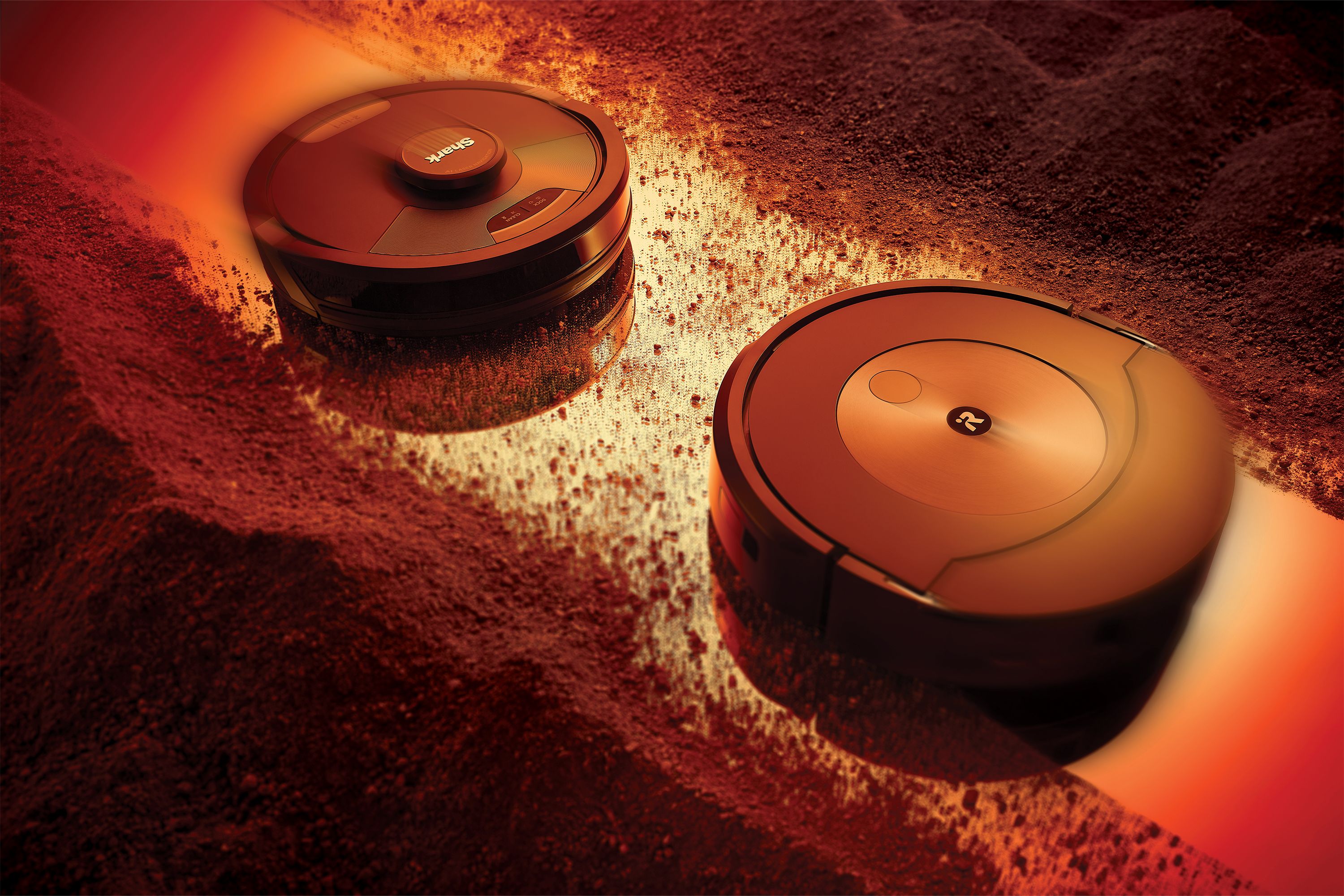Roomba Vs Dyson are leading competitors in the vacuum cleaner market: Roomba specializes in autonomous robotic units, while Dyson excels with powerful, manually operated machines. Consumers choose Roomba for automatic cleaning and Dyson for its superior suction and versatility.
Choosing between Roomba and Dyson vacuums often comes down to user preferences and cleaning needs. If the priority is a set-and-forget cleaning solution, Roomba’s range of robot vacuums offers convenience with their automated features, suitable for maintaining cleanliness across various surfaces.
On the other hand, Dyson’s vacuum cleaners are synonymous with power and efficiency, ideal for those who prefer a more hands-on approach to tackle dirt and debris more assertively. Cordless stick models from Dyson provide flexibility and ease for spot-cleaning and deeper cleaning sessions alike. Both brands bring their unique strengths to the table, with Roomba leaning towards technology and convenience and Dyson towards performance and control. As cleaning technology continues to advance, both Roomba Vs Dyson update their product lines with innovative features that aim to simplify household cleaning tasks.

Preamble: The Clean Tech Rivalry
In the world of home cleaning, two titans have emerged, battling for the crown of the ultimate cleaning companion. The rivalry between Roomba and Dyson represents a clash of titans in the clean-tech industry, pushing the boundaries of innovation and convenience. These brands have transcended being mere household names; they have become synonymous with the transformation of mundane chores into high-tech, almost leisurely tasks. This section delves into the storied competition of these two heavyweights.
Introduction To The Competitors: Roomba And Dyson
On one side, Roomba, a series of autonomous robotic vacuum cleaners, boasts a rich legacy of navigating through our living spaces with minimal human intervention. As pioneers in the robot vacuum domain, Roomba’s parent company, iRobot, has consistently delivered smart, effective cleaning robots that have found their way into the hearts and homes of users worldwide.
Opposing Roomba Vs Dyson, a powerhouse in cutting-edge vacuum technology and design. With a reputation for unwavering suction power and innovative designs, Dyson has revolutionized not just the traditional vacuum but a range of appliances that extend well beyond the confines of floor cleaning.
The Evolution Of Vacuum Technology In Home Cleaning
| Year | Milestone | Contributor |
|---|---|---|
| 1996 | Introduction of the first bagless vacuum cleaner | Dyson |
| 2002 | Launch of the first Roomba robot vacuum | iRobot |
| 2009 | Dyson unveils the Dyson Air Multiplier fan | Dyson |
| 2016 | Roomba gets Wi-Fi connectivity, evolving smart home integration | iRobot |
| 2018 | Dyson releases its first cordless vacuum with a digital motor | Dyson |
- Robot vs Stick: Roomba’s robotic vacuums contrast with Dyson’s powerful stick vacuums
- Innovation: Both brands constantly innovate to improve suction, battery life, and user experience
- User Autonomy: Roombas offers hands-free cleaning, while Dyson provides precise control
Design Philosophy And Brand Heritage
When the topic of high-tech vacuum cleaners surfaces, Roomba Vs Dyson stands out as frontrunners in innovation and consumer preference. Both brands showcase unique design philosophies and long-standing heritage within the vacuum cleaner industry. Roomba, developed by iRobot, leads with its high level of automation, emphasizing ease and convenience for the user. Meanwhile, Dyson charges forth with its powerful, high-performance machines, demonstrating a relentless passion for engineering excellence. This section delves into each brand’s ethos to help you understand the essence behind these cleaning powerhouses.
Product Range And Variants
Exploring the diverse world of vacuum cleaners, two household names stand out: Roomba Vs Dyson. Each brand offers a unique set of features across various models designed to cater to different cleaning needs. Roomba, with its focus on robotic vacuum cleaners, has revolutionized the way people clean their floors. Dyson, on the other hand, presents a broader range of vacuum cleaners, from uprights to sticks and even their own robot vacuums. We’ll delve into the specifics to see how their offerings compare.
Comparing Roomba’s Lineup: From Basic To Advanced
Roomba Vs Dyson: Roomba has built a name synonymous with robotic vacuum technology. The product lineup ranges from basic models suited for simple cleaning tasks to advanced robots equipped with the latest technology like smart mapping and voice control.
- Roomba 600 Series: The entry-level robots are perfect for those new to home automation.
- Roomba e Series: A step up with better suction and improved navigation.
- Roomba i Series: Offers personalized cleaning suggestions and smarter navigation.
- Roomba’s Series: The top-tier models with powerful cleaning systems and advanced features.
Dyson’s Diverse Vacuum Models: Upright, Stick, And Robots
Dyson’s offerings go beyond robot vacuums with a diverse range of handhelds, uprights, and stick vacuums, each designed for a different cleaning experience. Users can choose based on their preferences for power, portability, and floor type.
- Upright Vacuums: Ideal for traditionalists looking for power and reliability.
- Stick Vacuums: Known for their lightweight, cordless convenience without compromising on suction power.
- Robot Vacuums: Dyson’s entry into the world of autonomous cleaning provides hands-free operation with powerful suction.
Performance Benchmarks: Putting Them To The Test
Introduction
The battle between Roomba Vs Dyson robotic vacuums has always been fierce, with each brand boasting superior cleaning capabilities. Homeowners want to know which will deliver the cleanest floors with the least fuss. We put these contenders through rigorous performance benchmarks to determine which is truly the king of the clean. Tracking suction power, how quietly they operate, and battery longevity, we provide a thorough comparison between these titans of tidiness.
Suction Power and Cleaning Efficiency
Suction Power And Cleaning Efficiency
Suction power is critical when it comes to robotic vacuums. A high suction unit lifts dirt and debris efficiently, leaving no trace behind. For this test, we scattered various substances on different floor types to observe how well each robot picked up the mess.
Table for Suction Power
| Vacuum Brand | Tested Suction Power (Pascals) | Cleaning Pass Efficiency |
|---|---|---|
| Roomba | 1700 Pa | 95% |
| Dyson | 2000 Pa | 98% |
Noise Levels: A Quiet Operator or a Roaring Engine?
Noise Levels: A Quiet Operator Or A Roaring Engine?
Noise level can be the deciding factor for many users. We took a decibel meter to both Roomba and Dyson vacuums to determine which could clean up without causing a stir.
Unordered List for Noise Levels
- Roomba: around 68 dB – comparable to a conversation at home.
- Dyson: approximately 70 dB – similar to a running shower.
Battery Life and Operating Time
Battery Life And Operating Time
Battery capacity impacts how much ground a robot vacuum can cover on a single charge. We monitored both models to find out which one goes the distance.
Ordered List for Battery Stats
- Roomba: Up to 120 minutes of run time on a single charge.
- Dyson: Capable of running up to 75 minutes without needing a recharge.
User Experience And Operating Modes
When it comes to automating household chores, robot vacuums are a game-changer. Two industry leaders, Roomba Vs Dyson, offer advanced cleaning solutions, but their user experience and operating modes are distinct. Exploring the nuances of their ease of use, control, and maintenance will help you discern which one aligns with your lifestyle and cleaning needs.
Ease Of Use: Setup, Navigation, And Control
Both Roomba and Dyson excel at offering convenience, but their approaches to setup, navigation, and control have unique aspects worth considering:
- Roomba: Simplifies life with automated scheduling and smart navigation. The iRobot HOME App provides a seamless setup and customization.
- Dyson: Known for its intuitive design, it offers a straightforward setup. Dyson’s vacuums may include remote or app-based controls for easy adjustments.
Roomba’s prowess in room mapping technology often gives it an edge in navigation, ensuring thorough coverage. Dyson, with its commanding manual control, appeals to users who prefer a hands-on approach.
Maintenance Requirements: Cleaning And Part Replacement
Maintenance is integral to the longevity of any vacuum. Roomba and Dyson have varying requirements:
| Aspect | Roomba | Dyson |
|---|---|---|
| Cleaning Frequency | Regular bin emptying and filter cleaning are needed, especially in homes with pets. | Bin emptying is streamlined with point-and-shoot mechanisms, and the filters are engineered for longer intervals between cleaning. |
| Part Replacement | Brushes and filters require periodic replacement to maintain optimal performance. | Dyson’s parts are built for durability, but replacements, if necessary, are easily accessible. |
While Roomba may require more frequent check-ups, its maintenance tasks are generally simple. Dyson, on the other hand, boasts low-maintenance designs that save time.
Special Features And Innovative Technologies
The battle between the automated cleaning capabilities of Roomba and the powerful suction of Roomba Vs DysonRoomba Vs DysonRoomba Vs DysonRoomba Vs DysonRoomba Vs DysonRoomba Vs DysonRoomba Vs Dysons is fierce. Both brands have made a huge splash in the vacuum technology world, yet they take different innovative paths to achieve home cleanliness. Roomba, known for its robot vacuums, constantly updates its home navigation and cleaning efficiency systems. On the other hand, Dyson, renowned for its cordless stick vacuums, emphasizes robust engineering and ergonomic design. Let’s delve into the unique features each brand offers.
Room-specific Cleaning And Object Detection
Roomba’s room-specific cleaning technology leverages intelligent mapping to ensure your home is cleaned methodically and comprehensively. Several Roomba models, like those in the i and s series, come equipped with iAdapt technology and Imprint Smart Mapping, allowing them to learn and memorize the layout of your home, providing personalized cleaning schedules and room-specific attention.
Dyson, while not focused on automated pathfinding, offers intuitive object detection in the form of Dyson’s Dynamic Load Sensor (DLS) technology found in vacuums like the V11. This technology automatically adjusts the motor speed and suction power when a change in floor type is detected. This ensures that carpets get a deeper clean, and power is conserved on hard floors.
Pet Hair Performance: Which Vac Wins For Pet Owners?
When it comes to tackling pet hair, both brands have developed specialized tools and features designed to handle the fur and dander our furry friends leave behind. Roomba’s High-Efficiency Filter and Dual Multi-Surface Rubber Brushes are perfect for homes with pets. These features work in tandem to prevent pet hair from tangling and ensure allergens are trapped efficiently.
Roomba Vs Dyson counters with its Direct-Drive Cleaner Head and Mini Motorized Tool. The direct-drive head has stiff nylon bristles that dive deep into carpet fibres to remove ground-in dirt and pet hair. Meanwhile, the mini motorized tool targets upholstery and confined spaces, agitating pet hair for a thorough clean.
In summary, Roomba’s automated technology is ideal for convenience and hands-free operation, with a particular focus on room navigation. Dyson focuses on providing potent suction and precise cleaning tools to target pet hair and dirt, regardless of the surface. Both brands offer special features and innovations that make them leaders in their respective fields.
Cost Of Ownership: Price Points And Value For Money
When selecting a vacuum, the Roomba Vs Dyson brands stand out, but the initial price tag is just the beginning. Smart consumers consider the total cost of ownership, which includes upfront costs, long-term investment, and the ongoing expenses of consumables and accessories. Let’s dive into the nuances of these costs to see which brand offers the best value for your hard-earned dollar.
Initial Purchase Price And Long-term Investment
The initial purchase price can significantly impact a buyer’s decision. Roomba offers a range of models, from the more affordable 600 series to the high-end s9 series, giving consumers a wider spectrum of options. In contrast, Dyson’s stick vacuums and upright models maintain a higher entry point but exude luxury and powerful performance.
Dyson’s reputation for high-quality engineering justifies the premium cost to many buyers, considering it an investment into a long-lasting product.
Evaluating the long-term investment, we compare the durability and expected lifespan of these devices. Roomba’s robotic vacuums operate autonomously, potentially reducing wear from manual handling. Conversely, Dyson’s manual vacuums might require more careful maintenance, but they are built to endure. Both brands offer warranties that reflect their confidence in product longevity, ensuring that your investment is protected.
Comparing The Cost Of Consumables And Accessories
Beyond the initial expenditure, the cost of consumables and accessories is an ongoing factor to consider. Roomba’s robot vacuums need regular replacement of filters, brushes, and possibly batteries over their lifetime. This table outlines the typical costs associated with maintaining a Roomba compared to a Dyson vacuum:
| Part | Roomba | Dyson |
|---|---|---|
| Filters | $20-$40 (based on the model and pack size) | $30-$70 (based on the model) |
| Brushes | $15-$30 (based on the model and pack size) | Often included; varies for replacements |
| Batteries | $80-$120 (if applicable) | $75-$150 (replacement batteries for cordless models) |
While both brands offer their own ecosystem of replaceable parts and filters, Dyson’s parts tend to be on the higher end, reflecting their premium branding. However, Dyson’s engineering often allows for less frequent replacements, balancing the long-term costs.
- Dyson – typically offers larger capacity dustbins, reducing the frequency of purchasing replacement bags.
- Roomba – some models come with self-emptying stations, which use proprietary bags, adding to the cost over time.

Consumer Sentiment And Market Presence
When it comes to choosing the perfect vacuum cleaner for a spotless home, the battle often boils down to two titans of the tidying territory: Roomba Vs Dyson. Consumer sentiment and market presence significantly influence purchasing decisions, and these two brands have cultivated a noteworthy following. Analyzing the reviews, feedback, and brand trust dynamics can shed some light on the ongoing Roomba versus Dyson debate.
Reviews And Feedback: Roomba Vs. Dyson
Online reviews and customer feedback are treasure troves of information for potential buyers. Here’s how the two brands fare in the eyes of consumers:
- Roomba: Known for its robotic vacuum prowess, Roomba has garnered praise for its automation and ease of use. Users value the hands-off cleaning experience and the time it saves.
- Dyson: Dyson earns acclaim for its powerful suction and innovative design. Its cordless stick vacuums are particularly popular for their portability and effectiveness on various surfaces.
When directly comparing user satisfaction, Roomba satisfies the tech-savvy, looking for automation, while Dyson appeals to those who prioritize deep-cleaning performance.
Brand Loyalty And Trust: Customers’ Perspectives
Brand loyalty and trust resonate deeply within customer communities:
| Brand | Loyalty Factors | Trust Factors |
|---|---|---|
| Roomba | Consistency in performance; continuous software updates | Longevity of devices; responsive customer service |
| Dyson | Innovative features; premium build quality | Brand reputation; comprehensive warranties |
Users often commit to a brand when they see consistent quality and receive positive support experiences. Roomba has a loyal base that treasures the convenience of their automated systems, while Dyson users are frequently won over by the brand’s cutting-edge technology and unwavering performance.

FAQs For Roomba Vs Dyson
What Is The Downside To Roombas?
Roombas can struggle with thick carpets and sometimes miss spots. They have limited bin capacity and may require frequent emptying. Roombas can also get stuck on cords and may have difficulty navigating complex layouts. They can be less effective than traditional vacuums for deep cleaning tasks.
Is Roomba Made By Dyson?
No, Roomba is not made by Dyson. Roomba vacuums are produced by iRobot, an American company.
Is Dyson Really The Best Vacuum Cleaner?
Dyson vacuums excel in powerful suction and versatile cleaning capabilities, often considered top-tier by consumers and experts alike.
What Brand Of Robot Vacuum Is Best?
The best brand of robot vacuum is often considered to be iRobot’s Roomba for its advanced navigation and cleaning technology.
Conclusion
Deciding between Roomba and Dyson boils down to personal needs and preferences. Each brand brings innovation and efficiency to floor cleaning. Whether you value the hands-off convenience of Roomba or the powerful versatility of Dyson, you’re investing in quality. Your choice ultimately enhances your home cleaning regimen with a touch of modern technology.





